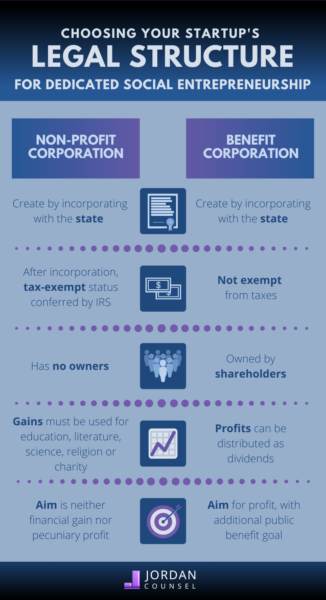Social movements that gain momentum occasionally “trickle up” into corporate America. When that occurs, business leaders may feel compelled to engage in corporate activism.
Around the globe, companies have recently reckoned with the Me Too, Fridays for Future and Black Lives Matter movements. While such reactive measures may be commendable, effective social entrepreneurs are typically more proactive. This article describes the five archetypal strategies for infusing corporate social responsibility (CSR) into US startups.
Strategy 1: Implement ad hoc CSR initiatives
Most startups have a lean structure and flexible management. With that agility, startups can easily implement, modify or terminate projects pursuant to the whims of senior management.
Most startups, however, do not have the bandwidth (or budget!) to simultaneously address every social issue. For that reason, some startup founders limit their CSR commitment to a single initiative that they implement throughout the entire company.

Peggy_Marco / Pixabay
Other startups broadly empower their operational teams to act in a manner that is socially responsible. In such companies all employees can engender corporate activism by persuading their team to adopt a CSR initiative.
Underscoring the wide range of possibilities, the following CSR initiatives have been implemented by numerous startups:
- Ethical Stakeholder Management
- Perks for customers who are nurses, teachers, seniors, veterans, active military or first responders
- Employee salaries that are at least a living wage
- Inclusion of certified women-owned and minority-owned businesses when issuing requests for proposals
- Flexible working schedules to facilitate employees’ religious observations
- Increased diversity in the pool of job applicants
- Inclusion of non-traditional family structures in marketing ads
- Paid family leave insurance
- Gender-neutral bathrooms in the workplace
- Environmental Responsibility
- Preference for office supplies that are made of recycled and recyclable material
- Subsidized public transportation tickets for employees
- Shower facilities in the workplace for employees who choose to cycle to work
- Preference for electric or hybrid automobiles (i.e., when cars must be leased or rented)
- Philanthropy
- Donations to non-profit organizations
- Educational scholarships and grants
- Donations to political campaigns
CSR initiatives should be reviewed by the company’s legal team to ensure compliance with state and federal law. For example, not all types of companies are allowed to make political contributions. Corporations–including non-profit corporations–are legally prohibited from donating to political campaigns. That same prohibition holds true for some limited liability companies (LLCs) and certain partnerships.
Strategy 2: Add CSR mission statement to LLC’s founding documents
Social entrepreneurs can include CSR provisions in their LLC’s articles of organization and/or operating agreement. If those provisions are worded as mandatory directives, senior management must ensure that all employees comply.
Nevertheless, articles of organization and operating agreements can be amended in the future with relative ease, especially in closely held companies. CSR provisions that are included in those documents are therefore not permanently binding. The modifiable nature of those provisions is especially relevant for startups that might seek new investors.
Strategy 3: Incorporate as a benefit corporation
Directors of corporations have a fiduciary duty to shareholders. That fiduciary duty, however, is often misunderstood. Many people falsely believe the duty obligates management to focus strictly on increasing profits (thereby eschewing social responsibility).
In reality, directors of most corporations are legally authorized to pursue any lawful purpose, not just maximize shareholder value. Nevertheless, disgruntled shareholders habitually complain when directors engage in corporate activism that (in the minds of those shareholders) hurts profits.
Benefit corporations are largely immune from that particular conflict between management and shareholders. This immunity stems from the explicit mandate given to directors of benefit corporations regarding the company’s CSR goals.
So what, pray tell, are the goals of a benefit corporation? Generally speaking, benefit corporations pursue one of the following endeavors:
- Provide low-income or underserved individuals or communities with beneficial products or services
- Promote economic opportunity for individuals or communities (beyond the creation of jobs in the normal course of company business)
- Preserve the environment
- Improve human health
- Promote the arts, sciences or advancement of knowledge
- Increase the flow of capital to entities with a public benefit purpose.
Social entrepreneurs who wish to establish a for-profit business that creates a material positive impact on society or the environment can therefore consider incorporating as a benefit corporation.
Strategy 4: Get certified as a B Corp
Some people sloppily use the term “B corp” when referring to all benefit corporations. That is incorrect. The descriptor “B Corp” only applies to companies that have been certified as such by the non-profit organization B Lab.
B Corp certification considers a company’s entire social and environmental footprint, including the impact on workers, community, supply chain, environment and customers. Said certification can be a key tool in the company’s marketing armamentarium. Potential B Corp applicants must nevertheless weigh that marketing benefit against the added expense, timing and requirements of certification.
All for-profit legal structures (including LLC, LLP, and C-corporation) may be eligible for B Corp certification. Startup companies that are brand new, however, are not eligible.
Strategy 5: Create a 501(c)(3) non-profit company
Non-profit startups can be organized and operated for one of the following purposes:
- Charity
- Religion
- Education
- Science
- Literature
- Tests for public safety
- National or international amateur sports competition
- Prevention of cruelty to children or animals.
While such benevolent purposes may sound similar to those of benefit corporations, there are several major differences between non-profit companies and benefit corporations. Unlike benefit corporations, not-for-profit corporations are not formed for pecuniary profit or financial gain. The income of a not-for-profit corporation cannot be distributed to that corporation’s members, directors or officers. Instead, all gains of a not-for-profit corporation are used to support the company’s benevolent mission.
A hallmark of many non-profit companies is tax-exempt status, which is conferred by the IRS. However, under Section 501(c)(3) of the Internal Revenue Code, only certain corporations, unincorporated associations and trusts are eligible for tax-exempt status. Sole proprietorships and partnerships are ineligible.
THE BOTTOM LINE
From a philosophical perspective, corporate activism can be considered an integral part of the social contract. In other words, companies are an intrinsic part of society and therefore have moral obligations to the community.
Even from a perspective that instead favors laissez-faire capitalism, social entrepreneurship can benefit a company’s bottom line by positively influencing the following metrics:
- Brand equity
- Domain authority
- Employee retention rates
- Customer loyalty
- Market share
Using the CSR strategies described above, startups can aim to do well while also doing good.
Business & Finance Articles on Business 2 Community
(30)
Report Post








